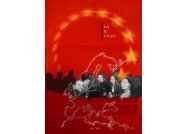turkish-greek civic dialogue - AEGEE Europe
turkish-greek civic dialogue - AEGEE Europe
turkish-greek civic dialogue - AEGEE Europe
Create successful ePaper yourself
Turn your PDF publications into a flip-book with our unique Google optimized e-Paper software.
”While Greeks name the persons displaced through exchange of populations<br />
as “göçmen” (emigrant), in Turkey they are called as “mübadil” (exchangee<br />
- exchanged) with reference to the price to be paid off.” R.Hirschon corrected<br />
that in Greek it’s not called emigrant but refugees.<br />
“Most of the Christian emigrants did not posses national Greek identity and<br />
understanding, their mind-set was set to pre-nation-state times. Community,<br />
sect and religion were important. They were loyal to the Patriarchy in İstanbul. In<br />
Thrace, there is very little understanding and acceptance of Turkish nationality.<br />
Each state wants to have an homogenous community. Therefore, Greece has<br />
taken into account the religious matters, however it still failed to create this<br />
homogenous state. There were even Christian Orthodox communities speaking<br />
in Kurdish.”<br />
“Integration of emigrants with the Greek community started with the launch of<br />
production, marriages with each other started only after 1950s. Furthermore,<br />
the children were provided with Greek language and culture thanks to Greek<br />
education system. Children of bourgeois families and children speaking Greek<br />
were more successful at school, whereas children of emigrants faced some<br />
difficulties. Children of emigrants were considered as being suspicious due to<br />
their nationalities and were feeling ashamed of that. In years, emigrants from<br />
Asia Minor, Black Sea and Thrace became full Greek citizens and gained more<br />
respect.<br />
Minority schools provided the children with Quran, mathematics and Turkish<br />
language courses. As the revolutionaries gained power in time, Turkish<br />
dimension drastically influenced education system in time at the beginning<br />
of 1950s. The curricula became the real Turkish curricula. Even the ones<br />
speaking “Pomakça” 1 as well as the gypsies were taught Turkish. Such an<br />
education system accelerated Muslims migration to Turkey.”<br />
During her speech, Nükhet Adıyeke made references to the Crete Island.<br />
”Immigration from Crete started earlier than the compulsory exchange of<br />
populations. Crete used to have a privileged status within the Ottoman Empire.<br />
1 The Pomaks live in the region of the Rhodope Mountains on both sides of the Greek-Bulgarian<br />
border. Their native language is Pomak (Pomachki). The Pomak language belongs to the linguistic<br />
family of the Southern Slavic language.<br />
Association des Etats Généraux des Etudiants de L’<strong>Europe</strong><br />
Since it was conquered at a later stage, the Ottomans did not implement their<br />
classic governance practices in Crete. The Ottomans did not ban Rum women<br />
who gave birth to their children from Turkish men to address their children in<br />
Rum”<br />
”Together with the appearance of Muslim identity, Crete lives an overwhelming<br />
Islamisation process. The Ottomans did not follow the policy of forcing Muslim<br />
population into the island through forced exchange; however 100 years later a<br />
Muslim population appeared in the island.”<br />
“The conquerors of the island are reported to get married with Rum women.<br />
However, the conquerors of the island were janissaries.”<br />
”Molly Green advocates that changing religion also enables a higher rank within<br />
the segments of the society, and the ones changing their religion can be a part<br />
of military and political class. The Ottomans allowed private property in Crete.<br />
The ones changing their religions became very fanatic and generated a lot of<br />
hatred from their previous fellows.”<br />
”Muslims and Non-Muslims were intensively involved in mutual trade and many<br />
of the cases are related with property. As a result of the Greek independence<br />
movement and nationalistic struggle started the mutual massacres.”<br />
NOTES FROM THE ROUND TABLE<br />
DISCUSSION<br />
POPULATION EXCHANGE RECONSIDERED:<br />
GENERAL ASSESSMENT<br />
On the last day of the symposium, a session was dedicated for the general<br />
assessment of the subject matter and the symposium itself. Ayhan Aktar<br />
highlighted once again the Islamic law practices in Western Thrace.<br />
Baltiosis stated that all the Macedonian emigrants are obliged to present<br />
and identify themselves as of Thessaloniki origin. On the condition that they<br />
Population Exchange<br />
135







